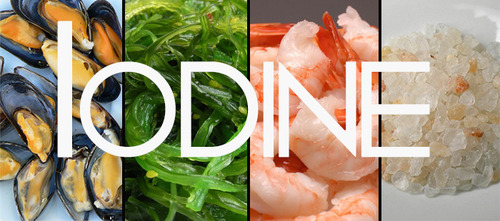Iodine, how does it impact your health?

Iodine is an element. The body needs iodine but cannot make it, therefore we all have a dependence on food and its absorption for maintaining the optimum balance of iodine.
Iodine deficiency most commonly affects the thyroid health, low iodine leads to an inability of our body in making the optimum level of thyroid hormone, this leads to signaling from the brain to produce more thyroid hormone and therefore swelling and inflammation of thyroid gland ensues. This condition is called Goiter.
Other consequences of low iodine can be :
- Infertility due to lack of thyroid hormone and in turn no ovulation
- Research is strongly indicative of its association with Prostate, breast, ovarian, endometrial cancers.
- Autoimmune diseases may set in due to this deficiency
- Deficiency leads to a sluggish metabolism and therefore weight gain
- Poor nail skin and hair health
- Mental health issues are common with deficiency
- Compromised immunity is common with deficiency
- Deficiency leads to obstructed detoxification from bromine, chlorine, fluoride etc. these are commonly added to public water supplies and can be cancer causing.
- Deficiency can cause other hormone imbalances too.
Foods That Provide Iodine:
- Foods From the Ocean: Since iodine occurs in ocean sediments and ocean water, top sources include seafood, shellfish, and sea vegetables or seaweed, which are iodine superfoods. A sheet of seaweed may contain between 16-3,000 mcg of iodine.
- Produce Grown in Iodine-Rich Soil: When grown in iodine-rich soil, vegetables may contain higher levels of this element. Generally, farms in coastal regions, or which were historically under the ocean have higher iodine content in the soil.
- Iodine-Rich Fruits & Vegetables: Some fruits and vegetables contain iodine, including potatoes,Lima beans. Among fruits, cranberries, strawberries, prunes, and bananas have the highest amounts. One banana provides 3 mcg, and five prunes or one cup of strawberries contain 13 mcg. That’s still only about 10 percent of the Recommended Daily Allowance of 150 mcg for adults.
- Himalayan Pink Salt: Some people consider table salt a good source of iodine. However, not only is table salt bleached with chemicals, but iodine is artificially added to the sodium chloride. Instead, I recommend Himalayan pink crystal salt which has a natural level of iodine.
- Boiled eggs, Cheese & Yogurt: These too are rich natural sources of iodine.
Dr. Kalpana Shekhawat
Functional Medicine Specialist
